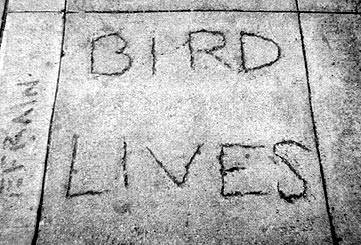Week 25: Bird: Original Motion Picture Soundtrack
Two weeks ago, we were listening to "Birdland" by Weather Report, and this week we come full circle: that song took its name from a New York jazz club, which was itself named after Charlie "Yardbird" Parker—better known as just "Bird." Parker was one of the most influential saxophonists in the history of jazz, and is the subject of Clint Eastwood's 1988 biographical film Bird, from which we get this week's album.
Eastwood is a lifelong lover of jazz for whom Parker was a particular inspiration. So when he set out to tell Bird's story, he faced a problem: given Bird's untimely passing, the recordings we have of him are generally of poor quality, and would have stuck out sorely in the movie. Eastwood and music supervisor Lennie Niehaus agreed that having a contemporary saxophonist "dub" Parker's iconic playing would be sacrilegious, so they tasked the audio engineers with surgically extracting Parker's solos from those original recordings (!).1 Contemporary musicians then re-recorded the other parts alongside those authentic Parker solos for the film's score.
As part of this week's research, it only seemed right that I supplement the soundtrack by watching the movie. It's over two and a half hours long, but it never seemed to drag for me, owing largely to the warmth, humour, and almost childish tenderness Forest Whitaker brings to the lead role. In my viewing, two things stood out in particular: first, it was fascinating to be visually immersed in the jazz culture of 1950s New York City. Throughout this project, our exposure to the leading names of jazz has been almost exclusively through their musical output—Eastwood's biopic delivers the sights and social dramas of the period in addition to the music. And while the NYC of today in many ways looks quite different compared to that depicted in Bird, one scene hasn't changed: wherever jazz thrives, there will be bustling clubs filled with drink-laden tables and packed with an audience enraptured by the cats on stage.
Secondly, it was fascinating to be reminded of just how controversial bebop was in its nascent days—after Bird and the gang try to bring this new style to the West Coast, their engagement is cancelled early, with some unnamed music executive declaring "bebop tends to pervert young minds." Hoo boy! In our era of drill music, and, well, WAP, it's quaint to see how reviled bebop was for its… use of chromatic scales? (Yes, okay, presumably much of that ill reputation was due to bebop's association with the drug scene—that same drug scene that killed Bird before 35, along with a slew of other jazzmen—but still, perverting young minds??)
But for all these words I have yet to comment on the music itself. Alas, I clearly have yet to achieve jazz transcendence: for all my efforts, I can't quite detect what makes Parker so singularly spectacular. That's not to say I didn't enjoy it—"Lester Leaps In" has infectious energy; "Laura" is heart-wrenching; "April in Paris" might've won last week's Standards Showdown —but what most caught my ear were Jon Faddis's fleet-fingered trumpet solos on "Ko Ko" and "Ornithology" (where he covers his mentor, Dizzy Gillespie).
Let me close this week by once again lamenting the devastating effect that heroin had on Harlem and jazz, aptly chronicled by Stephen Eide in this piece. That is only one of innumerably many examples of communities ravaged by drugs, but it is one that robbed us of so many musical visionaries at their peak. Though Charlie Parker was taken from us far too soon, he is not forgotten—Bird lives.

Favourite track: Ornithology
Some of these recordings weren't even commercial, they were friendly sessions recorded on very early tape recorders. A few even came directly from the private collection of Chan Parker, Bird's long-time common-law partner.